It’s been a long trip to the top, but now he’s there, Geoff Spencer is clearly out to change the way that DB Schenker is perceived.
He’s the chief executive of Britain’s largest rail freight company. His rise through the DB ranks has taken him to mainland Europe, and he has observed the rail freight sector from the frontline and from behind a desk. It is a grounding that Spencer believes has been invaluable.
DB has been quiet on the communications front for many years, even before the German giant bought the former EWS in 2007 from a consortium of Canadian National Railway, merchant bank Fay Richwhite and US investment groups Berkshire Partners and Goldman Sachs. It’s just not in its nature to boast about its achievements, but that was before it faced increasingly stiff competition from Freightliner and GB Railfreight, with Direct Rail Services also chipping away. Then there’s Colas Rail, which in recent months has also begun winning contracts, with significant gains in the oil and infrastructure markets.
Yet DB remains the biggest of the lot. And it’s a position it doesn’t plan on losing any time soon.
Based in Doncaster, Spencer is not far from where his career began. On November 10 1986, he began work as a Secondman at Healey Mills. From there he took on various roles, including working in the office.
He trained on various traction, but felt his career was going slowly. And so he moved to passenger trains for three years at Huddersfield, where he was based as a driver. While there he was asked if he wanted to become a Train Crew Supervisor, and then Traction Inspector.
In 1998 he became Traffic Traincrew Manager, which involved a six-week regional operations move to East Midlands and Anglia.
The following year he became Regional Operations Manager at Warrington Bank Quay - this role covered the West Coast Main Line from Crewe to Carlisle. From there he moved to EWS’ offices at Doncaster and became Director of Resources, which he describes as fascinating.
When the EWS business units were set up in 2005, Spencer was in charge of everything that was not part of one of the units, including planning, safety and procurement. As part of that role he was also involved in setting up Euro Cargo Rail (ECR) in France. Spencer says that things had to work with reliability. Consistency was key.
In 2010 he was asked to move to Mainz in Germany for a new role. This was a slightly different job, with responsibility for DB’s fleet, including locomotive purchases and European-wide fleet strategy. He also had to introduce benchmarking regarding DB’s productivity, while ECR still formed part of his thinking.
In September 2013, Spencer returned to the UK as chief executive - the first time a DB Schenker chief executive had been based in the UK since Keith Heller retired in 2011.
Spencer says DB’s view is that ECR helps to develop a European-wide rail network, although there are issues: “Different gauge is the issue. We are part of Europe, but you can’t change history.
“Part of the discussions we have include: do we buy locomotives with three safety systems? That is costly. So we need to work that out.”
He speaks of the UK mentality: “In the UK you think it is the end of the line. It isn’t. We are part of the European network.”
There have been accusations that DB is only interested in the Channel Tunnel. Locomotives have been exported, with Class 66s moving to ECR in France and Poland, and ‘92s’ heading to Eastern Europe.
Spencer refutes those suggestions: “The strategy is Europe. A good sign is the investment in Barking. That is a substantial cost, one that DB would sign off. If we have an investment case the European board will back us. I have not been rejected yet.”
The project at Barking features the development of a multimodal Euro-hub for the import and export of finished vehicles. It will be the only rail-linked facility of its type in the country, connected to HS1. DB has a 20-year lease on a 34-acre site that will accommodate unloading, storage, preparation and distribution.
The operator says the site will be ideally situated at the most westerly point of connection to the European rail network, providing a pivotal link between the UK and Europe. Initially the terminal will be able to handle up to 150,000 finished vehicles per year.
DB expects it to open in March. It has the potential to create 21 local jobs over the coming years, and will have the capability to handle both international and domestic intermodal traffic, presenting a genuine opportunity to drive modal shift.
“There is nothing near the capacity for HS1. This is about innovation,” says Spencer.
He says that within the UK, the markets are changing: “Coal is volatile, it will drop off eventually.”
RAIL queries why DB does not have a bigger presence in the biomass sector, which seems to irritate Spencer.
“70% of Drax biomass is moved by us. There are not yet many others working with biomass. We expected more power stations, but I think there is a delay in the commissioning of certain facilities. There are still some decisions to be made, too.”
The markets have also changed in terms of what can be carried.
“We have learned that you need to move as much volume as you can. The length of the train is more efficient than others, when it comes to biomass.” (All biomass traffic at Hull and Immingham is moved by DB.)
He continues: “Intermodal is also very important in our development. There is a will to invest. Anubis is here , and that is an indicator of the strength we have. We are rolling out a £7 million replacement of all the hardware we have for systems right across Europe. It is the same with the planning systems. Productivity is vital.”
Planning is clearly something Spencer believes is vital to the business.
“There are a few things we need to do. Strategy is part of the European network. The traditional markets are evolving, or may cease. We need to reinvent and invest a lot.
“But how do we get the best out of markets? What do customers want? This is what we want, to work with the supply chain. Our competition is the roads.”
Planning and having a sensible idea of what the competition may be is all well and good, but how does Spencer hope to implement this?
“Different customers have different requirements. We need to design something that will take certain costs out. If a train is late it is not just one box, but for a lorry it is. Reliability is important.”
He continues by ramming home his viewpoint: “Quality, quality, quality is the key issue. We are nothing without customers.”
Freight Performance Measure is discussed. This is designed to measure how freight trains are operating, in a similar way that Public Performance Measure does for passenger trains.
“The drive for performance reliability is not driven by FPM, it is about service to customers,” says Spencer.
However, he speaks highly of what Network Rail is trying to do.
“Paul McMahon is great. We started at the same time - he wants a collaborative nature. There is an open relationship. There are things we need
to do as an industry.”
Spencer suggests expense may be an issue: “It is capacity on some routes. Electrification will help. And when HS2 comes, it will free up paths.
“It is nice to see Network Rail planning. Do you know what the average speed of our freight trains is? 22mph. If we can get better paths that improves.” He says that the Midland Main Line already suffers from capacity constraints.
Spencer notes that people seem to be more open-minded towards freight these days, and that “it feels good” that McMahon is speaking to the industry.
“Our biggest tonnage is coal. There is significant aggregates growth, and we have recently invested in Bow East Terminal for that. We are about to order some new wagons and have moved HTA wagons to aggregate flows, too. There is a huge draw for aggregates in London.”
Aggregates is a big market for DB Schenker, he says. “We saw that this is a market we
want to be in, that is growing. We want to be there for a period of time. If we enter a market then it needs to last.”
Spencer says that the deal with Mendip Rail, where huge stone trains run to and from quarries in the Mendips, has witnessed increased tonnage: “We plan 92 trains per week and that has risen to 130. We have invested a lot for that deal, and are working with customers to improve it.”
He also believes that automotive is a big market. “It is a big deal. There is significant investment there. We are getting into the European market, and there are a lot of parts transported.
“I think that it is a changing market. Most things can and will travel by intermodal.”
But if the markets are growing, does the fleet need to grow?
When first privatised, EWS was quick to buy 250 Class 66s and thousands of wagons, and followed this up with an order for 30 Class 67s. But since then it has not placed any orders, while DB’s competitors have bought Class 66s, ‘68s’, ‘70s’ and ‘88s’. Rebuilt Class 73s are being introduced, while GB Railfreight sees a market for Class 92s.
Meanwhile, EWS (and later DB) has been sending locomotives abroad, or selling them. So, almost 17 years after the first Class 66 arrived, is there a market for a new fleet?
“We have no plan to buy locomotives. Class 66s are becoming more reliable. We use condition-based maintenance, and are now more proactive when it comes to their failures.”
DB’s Class 60s also have a future (RAIL 767). “They are a strategic effort. They have not been heavily used before,” he says.
The operator also has the ability to “switch the fleet”, he says. “We have Class 66s in France and Poland, and ‘92s’ abroad. We can call them back if we have to. The ‘66s’ in France can come straight back. Locomotives in Europe can move around.
“We have capacity. The Class 92s are at a startup operation that couldn’t afford new traction. The only reason locomotives are not imported to the UK is because I cannot bring European gauge locomotives into this country.”
Capacity and performance is key to what DB does. Says Spencer: “It is different relationships with customers. We will not put our foot through the door, and we will not trade off price for quality. We aim to deliver our promises, and if we cannot do it we will say.”
DB has taken on 280 staff in the past year. “We are underpinning the business,” says Spencer, adding that the figure includes former staff who have returned to the DB fold.
“We wanted them back, and they wanted to come back. We are creating a culture here. We create leadership… we give a framework. I want people to be empowered. It is about a culture change… a culture change that we are driving through. As a senior team we have developed values, and we succeed as a team.”
Spencer set about implementing this strategy when he returned to the UK: “My view is setting standards and manage them. Give them the capability to be able to do their job.”
He says DB has examined how it recruited staff previously. “We had problems with drivers, so we spoke to the unions, to ASLEF, and did a three-year deal with it. We have a good working relationship with the union. We continue to work with them.”
Driving schools have been introduced at Toton, he explains. “We are recruiting off the street. I want to talk to them in the first week.”
Safety is also a key driver. “It is vital. We did a review and asked what the issues are. It is about that focus. I like the ‘Switch on to Safety’ mantra.”
He says that when DB was investigating safety issues, it found that one of the biggest problems was people falling down stairs, so now staff must hold on to the stair rails. It may seem a little thing, and perhaps irritating for visitors when it is implemented, but it is working. “We want that across the business.”
Spencer also wants to introduce a ‘performance for quality’, which entails the introduction of performance manager centres. Meetings take place at 1500 on a Monday, and take one hour.
“We use a radio-controlled clock, and have to be there. God help your career if you are late. If we don’t behave like that, why will a train? You have to lead from the top and set the standards.”
Spencer says he can see improvements, which has led to him (and the business) thinking about how it gets to the next level.
How will DB get there? He explains that the quality of planning and the quality of the plan are key. “My expectation is to get a quality plan that is deliverable.”
His aim is for DB to focus on “things that happen day to day”, adding: “I want to work with customers and how we best suit them. I only want locomotives to be at depot for exams or repairs. That focus is the key.
“It is encouraging to be innovative. It is encouraging to try things. If it doesn’t work it doesn’t work, but we will encourage people to have a go. Some of the best things we do have come from ideas from people on the ground.”
There has been investment in a wheelshop at Marcroft’s Stoke facility.
“We listened to the team there. They came up with ideas. One had reduced the turnaround time for wagons, and it reduces the dwell time the vehicle is out of use.
“We want to be asset-intensive. A workshop is best when it is empty. We have an automated report system that shows how long the locomotives have been stood. You don’t want locomotives stood around. I want continuous improvement. It is about never being satisfied.”
The company’s staff is buying into this, he says. “You can never do what everyone wants, but I think you can adapt.”
Spencer speaks a lot about his staff. That’s because he is proud of them.
“I was really proud of John Gallagher, a safety rep. He won an award recently - a Lifetime Achievement Award. We need to recognise the work that they do. John had done more than 40 years on the railway. We need to recognise that more.
“I am proud of the focus they have on customers. It is more collaborative.
“There are two things customers want - they want quality and to like the people they work with. When we do a presentation we focus on this. I don’t do the presentations; I get the people who will work on the job to do the presentations. We need to show the organisations that we care - and we do, passionately. They have to go that extra mile.”
Going forward, Spencer says: “The big challenge is the change in the markets. We need to get in there now. Get the right investment.
“We do rolling five-year plans, and there are parts of DB culture that we can learn around. Also, you will move around the business, and that benefits everyone.”
He leans back in his chair: “I think back to 1986 when I was working with drivers who had been on the railway before the Second World War.
“Harry Sidgrove was one. He’d gone through nationalisation… war… dieselisation. He said we’d had the best of the railway. I used to think he was right. But you know what? He wasn’t.”
- This feature was published in RAIL 768 on February 18 2015


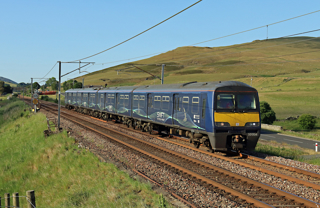
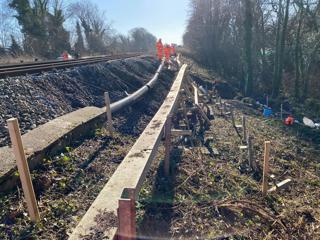
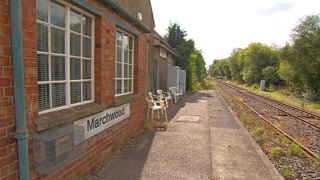
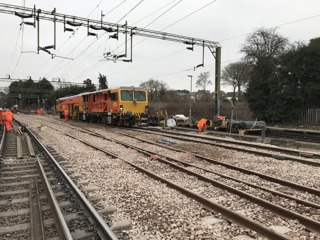
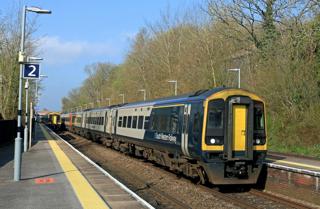












Login to comment
Comments
No comments have been made yet.